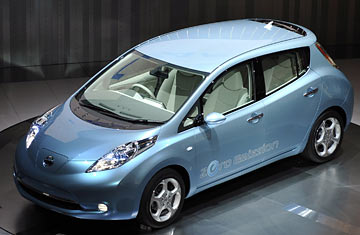
Reporters in Yokohama, Japan, take pictures of the new Nissan electric car called Leaf
(2 of 2)
Dealers will ask prospective buyers some strange questions too, such as "Do you own a garage, for in-home refueling?" If the answer is no, an old-school, fuel-efficient Civic might be a better choice. And if your commute is more than 40 miles, well, you might want to kick the tires on a nifty hybrid. If, like Q'Orianka, you want a fuel-cell car, but you're not living in the Southern California hydrogen-fueling cluster, sorry. Only a dozen hydrogen-fueling stations exist, all in a 60-mile stretch between Newport Beach and Santa Monica.
According to Ellis, such customer research is necessary "to filter out customers so the experience is a positive one." Ellis has only 10 people on fuel-cell leases but is hoping for 200 next year.
In contrast to Nissan, Honda has passed up pure electrics, preferring instead to bank on lower-cost hybrids (Civic and Insight) and hydrogen fuel cells. Ellis, however, claims no distinction should be made between "FCs" and electrics, since a fuel-cell car is basically an electric car powered by hydrogen-created electricity.
Then there is Toyota, the 800-pound hybrid gorilla. Toyota has yet a third route to success: muscling up on its hybrid strength.
"We believe in not being first to market but being best to market," says Mary Nickerson, who is in charge of advanced-vehicle marketing at Toyota Motor Sales, also in Torrance. Last year, Toyota reached the 1 million sales mark with its Prius hybrid (gas-powered with fuel-saving electric technology).
"Our strategy is to be the hybrid masters, no pure electrics, and to explore fuel-cell technology," says Nickerson. "We feel it's going to take a lot more than one technology to make this new market work." Toyota began testing fuel cells in 2002.
Toyota is investing heavily in its hybrid platform, offering more models, both larger and smaller. In 2010 it will start a demo program for plug-in hybrids with an "eco mode," or a downtown-use option, in which the vehicle will run for 20 miles on electricity before the gas engine kicks in.
Toyota's intrepid Prius customers are ripe for the next big thing, says Nickerson, noting research shows that a high percentage of Prius owners are likely to consider pure electrics or hybrid plug-ins. "Prius owners are people very comfortable trying new technologies because of their positive experience with Prius," she says.
But this same internal research shows some big inconveniences too. Some 21% of consumers will not consider a pure electric car because of the need to plug-in at home, according Nickerson. "We believe that 10 years out, the winners will be all new technologies, but hybrids will be the largest winner of them all."
Then again, as Honda's Ellis says, "It all depends on the price of gas."
